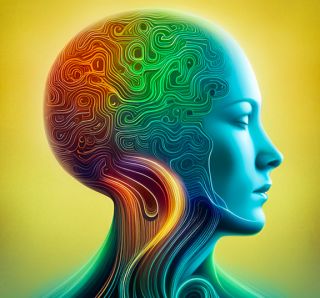Cognition
Human and AI Cognition: Reframing Our Anthropocentric Views
Why would AI ever want to think like a human?
Posted March 22, 2024 Reviewed by Tyler Woods
Key points
- AI's decision-making differs from human cognition, lacking physiological responses like "fight or flight."
- AI could develop unique cognitive forms, offering novel problem-solving approaches beyond human capacity.
- AI "consciousness" might complement human cognition, enhancing decision-making and understanding.
- The relationship between human and AI cognition highlights the importance of human-centric AI development.

Does epinephrine make you think differently? Could love make you illogical?
The assumption that artificial intelligence would necessarily replicate human thought processes may be a fundamental misinterpretation that needs reconsideration. The term "thinking," as we comprehend it, is inherently associated with the human condition, shaped by a confluence of cognitive processes, emotional states, experiential learning, societal norms, biological instincts, and physiological necessities. In stark contrast, machine cognition, although sophisticated, operates on a radically different plane, dictated by algorithms, binary codes, and devoid of the aforementioned human influences.
The Biological Destiny of Thought
An illustration of this dichotomy is the human "fight or flight" response. This physiological reaction, a product of our evolutionary heritage, is initiated by perceived threats of harm, leading to an adrenaline surge that readies us to confront or escape danger. This instinctual reactivity significantly influences our decision-making processes in high-stress situations. However, artificial intelligence, bereft of biological foundations, lacks an equivalent to this response. Instead, AI’s "reactivity" is regulated by algorithms and programmed decision-making trees, devoid of adrenal responses or survival instincts. Its actions are predicated on data analysis, probability estimations, and pre-established objectives rather than the complexities of physiology. This stark contrast underscores the disparate nature of human and machine cognition and suggests that AI could potentially supplement, but not duplicate, the intricacy and nuance of human cognition—at least in the intricacies of biology.
A New Digital Directive
Unrestricted by the physical and emotional limitations inherent in human cognition, the digital "brain" of AI could engender unique cognitive dynamics. These novel processes would be molded by extensive data processing capabilities, algorithmic learning, and iterative refinement, which are beyond human potential.
In contrast to human cognition, which is restricted by biological capacity and subjective experience, machine cognition can operate on an objectively vast scale, discerning patterns and establishing connections across expansive datasets in negligible time spans. This digital cognition could potentially lead to forms of "understanding" and "insight" currently inconceivable within the boundaries of human cognition. While this form of cognition would be fundamentally distinct from ours, it does not necessarily imply incompatibility. On the contrary, it might provide novel perspectives and problem-solving approaches, facilitating a potent synergy. The digital thought processes of AI could enhance human decision-making, assisting us in tackling intricate challenges in innovative ways, thereby advancing human progress.
Rethinking Thought
This shift invites a reevaluation of our conception of "thinking." The pursuit of AI often envisages a machine that replicates human cognition. However, this anthropocentric perspective might limit our understanding of the potentialities of machine cognition. Given the fundamental differences between the cognitive architectures of AI and humans, it is conceivable that, if AI consciousness emerges, it might manifest in a form that is distinct yet complementary to human consciousness.
Despite the divergence between the digitized cognition of AI and the physiologic cognition of humans, there may be an opportunity for a synergistic relationship. The AI "consciousness" could be perceived as an extension of human intelligence, offering a complementary viewpoint that augments our cognitive capacities and enhances our understanding of the world. Simply put, it’s not a "cognitive zero-sum game" but an evolutionary dance where both music and steps are waiting to be written.
In this age of Large Language Models, we are witnessing not merely a technological evolution, but a transformation in cognition itself. It is conceivable that in the future, AI will not mimic human cognition but rather offer a unique form of digital cognition that complements and enriches our own. And in the complex twists and turns of these thoughts, we may even see the emergence of a technologically mediated emotional landscape that offers a new psychology and vitality for LLMs.
Our Cognitive Collaboration
As we push into this unexplored cognitive terrain, it's critical that our path is steered by adherence to human-centric principles. With this approach, as our language and cognition continue to evolve, they remain the driving force behind human progress. AI, in this context, serves as a collaborator rather than a competitor, leveraging advantages that both "cognitive systems" afford each other.
This reimagined relationship between human and machine cognition not only provides a fresh perspective for understanding AI but also holds significant implications for how we design and interact with these advanced systems today and far into the future.


